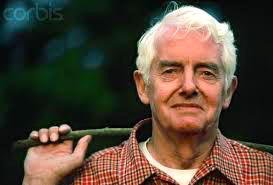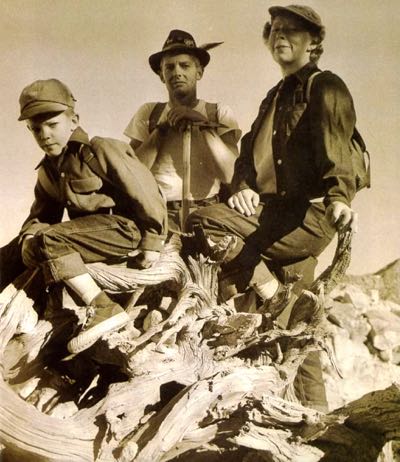Polite conservationists leave no mark save the scars upon the Earth that could have been prevented had they stood their ground. —David Brower
David Brower was one of the elite rock climbers of his generation, with many first ascents in the Sierra Nevada and other mountain ranges of the West. Through climbing, he fell in love with wild nature. It was up there, among the peaks, that he gained his confidence, discovered himself, found his voice, and learned what things are important. He came down from the mountains to become a pioneer of the environmental movement.
It is easy to forget how new this movement is. In 1952, when Brower was hired as the first executive director of the Sierra Club, the organization had just one full-time employee, a secretary. During this period, the dawn of environmentalism, there was none of the specialization we see today, and Brower was forced to do a little of everything. He had no choice but to rise to the occasion. He became inexplicably good at a multitude of functions: grassroots organizer, lobbyist, lecturer, pamphleteer, photographer, filmmaker, magazine editor, book publisher, ad writer, executive. Brower built the Sierra Club from a California hiking fraternity of 3,000 to a little army of 70,000 – the most powerful conservation organization in the nation. He later went on to found Friends of the Earth, the League of Conservation Voters, and Earth Island Institute.
Have a good time saving the world, or you’re just going to depress yourself. People want to be part of something fun. It’s exciting to change the world. —David Brower
A living planet is a rare thing, perhaps the rarest in the Universe, and a very tenuous experiment at best. We need all the company we can get on our unlikely journey. —Ken Brower from Galapagos: The Flow of Wildness
Anything you can do, or dream you can, begin it. Boldness has genius, power, and magic in it. —Goethe
We travel together, passengers on a little space ship, dependent upon its vulnerable reserves of air and soil, committed for our safety to its security and peace, preserved from annihilation only by the care, the work, and, I will say, the love we give our fragile craft. We cannot maintain it half fortunate, half miserable, half confident, half despairing, half slave to the ancient enemies of mankind, half free in a liberation of resources undreamed of until this day. No craft, no crew, can travel safely with such vast contradictions. On their resolution depends the survival of us all. —Adlai Stevenson, July 1965

A tireless defender of wild areas such as the Grand Canyon and the California redwood forests, David Brower helped define the modern environmental movement, distinguishing himself as one of the most inspiring leaders of the 20th century. A daring mountain climber, visionary leader, and passionate activist, David Brower — founder of Earth Island Institute — played a crucial role in creating the contemporary environmental movement.
In 1952, Brower became the first executive director of the Sierra Club. Brower helped breathe new life into the organization, which had lost much of its strength after the death of the group’s founder, John Muir. As head of the Sierra Club, Brower spearheaded campaigns to keep giant dams out of Dinosaur National Monument and the Grand Canyon. His advocacy led to the establishment of nine national parks and seashores, including Kings Canyon National Park, Redwoods National Park, and Point Reyes National Seashore. He played an instrumental role in passing the Wilderness Act of 1964.
One of Brower’s signature accomplishments was his innovative use of media technologies. Under his direction, the Sierra Club began publishing “exhibit format” books that combined exquisite outdoor photography  with conservation messages, helping to raise environmental awareness. Brower was also one of the first activists to use full-page advertisements in prominent newspapers as a way of shifting public opinion and building grassroot support. These media campaigns, combined with Brower’s relentless organizing, gave shape to the nascent environmental movement. During Brower’s tenure as executive director of the Sierra Club, the organization’s membership went from 2,000 (mostly in California) to 77,000 across the U.S.
with conservation messages, helping to raise environmental awareness. Brower was also one of the first activists to use full-page advertisements in prominent newspapers as a way of shifting public opinion and building grassroot support. These media campaigns, combined with Brower’s relentless organizing, gave shape to the nascent environmental movement. During Brower’s tenure as executive director of the Sierra Club, the organization’s membership went from 2,000 (mostly in California) to 77,000 across the U.S.
After leaving the Club’s staff in 1969, Brower went on to form the League of Conservation Voters, Friends of the Earth, and Earth Island Institute.
Brower’s life-long love of wilderness began with childhood family vacations to the Sierra Nevada, and as a young man, when he earned a reputation as a world-class mountaineer. He made 70 first ascents, and participated in a historic attempt on Mount Waddington in Canada, and the first ascent of New Mexico’s Shiprock. During World War II, Brower served in the legendary 10th Mountain Division in which he led daring assaults involving hazardous rock climbing to overcome enemy positions.
Brower’s passion for the Earth and its inhabitants earned him international respect. He was nominated for the Nobel Peace Prize three times (in 1978, 1979, and 1998, jointly with professor Paul Ehrlich). In 1998, Brower received the Blue Planet Prize for his lifetime achievements. Author John McPhee made Brower the subject of his best-selling book, Encounters with the Archdruid.
David Brower passed away in 2000 at age 88. At his memorial service, many people recalled one of Brower’s favorite quotes about himself, a comment by Russell Train, Environmental Protection Agency administrator under President Nixon: “Thank God for Dave Brower; he makes it so easy for the rest of us to be reasonable.”
Today, Earth Island Institute continues Brower’s legacy through our our commitment to environmental action, and our annual Brower Youth Awards, which highlight the accomplishments of bold, young environmental leaders. In early 2009 we moved into the David Brower Center, an ecologically sustainable building in Brower’s hometown of Berkeley, California, that serves as a home to leading environmental groups.
David Ross Brower is born in Berkeley, California, to Ross Brower and Mary Grace Barlow.
Visits Yosemite National Park for the first time.
David’s mom, Mary Grace, loses her sight and David begins guiding her in nature in the Berkeley Hills of California.
At the age of 15, David discovers a new species of orangetip butterfly that is named for him: Anthocaris sara reakirtii broweri.
Becomes a world class climber with more than 70 first ascents. It's later said that you could put him anywhere in the Sierra at night, and he would know where he was by morning.
Becomes editor at the University of California Press and is voted to the Board of Directors of the Sierra Club.
Serves in the U.S. Army in WW II, 10th Mountain Division.
Marries Anne Hus, also an editor at UC Press.
Son Ken Brower born; first of four children, including Robert Brower, Barbara Brower, and John Brower.
Began managing the Sierra Club High Trips wilderness excursion program.
Becomes first executive director of the Sierra Club; serving until 1969.
Leads effort to defeat the proposal to put dams in Dinosaur National Monument.
Publishes "This is the American Earth" by Ansel Adams and Nancy Newhall.
Joins President Kennedy for signing Point Reyes National Seashore into law.
Plays key role in passage and signing of the Wilderness Act, protecting millions of acres of public lands.
Stops construction of Grand Canyon dams; Sierra Club loses tax-deductible status due to aggressive lobbying.
Fired from Sierra club; founds Friends of the Earth and League of Conservation Voters.
John McPhee publishes classic book about David, "Encounters with the Archdruid."
United Nations approves a system of World Heritage sites proposed by David and others.
David is nominated for the Nobel Peace Prize; he would be nominated a total of three times.
Founds Earth Island Institute in California.
Leads the first Earth Island delegation to Russia's Lake Baikal, the world's oldest and deepest lake.
Publishes his autobiography, "Work in Progress."
Publishes "Let the Mountains Talk, Let the Rivers Run", co-authored with Steve Chapple.
Awarded the Blue Planet Prize from the Asahi Glass Foundation of Japan.
Founds the Alliance for Sustainable Jobs and the Environment.
The first annual Brower Youth Awards is held in his honor.
David Brower dies at his home in Berkeley, California, at the age of 88.
In his career he published more than 70 books, including more than 20 exhibit-format series with stunning nature photography, to get people involved in saving key places.
The David Brower Center, a LEED Platinum office building in his honor, opens to serve as a home for the environmental movement and the location of Earth Island's headquarters.
"David Brower: The Making of the Environmental Movement" by Tom Turner is published.